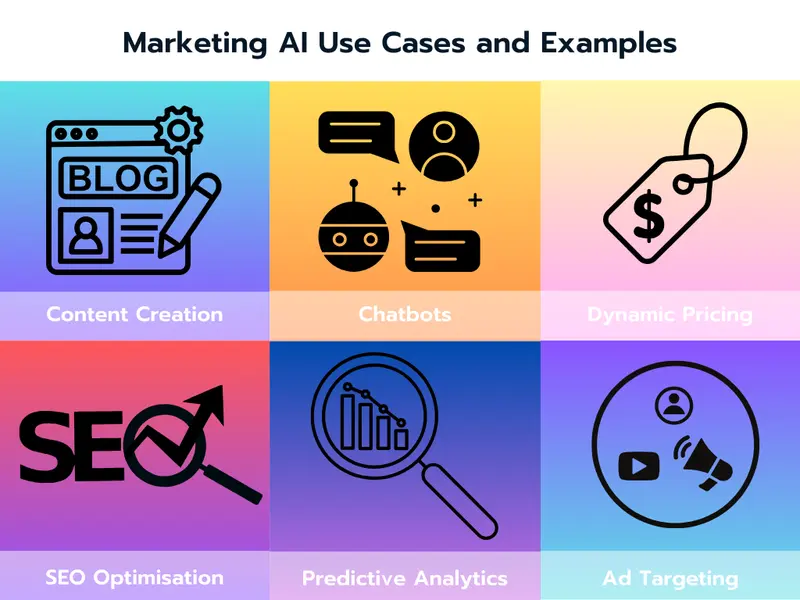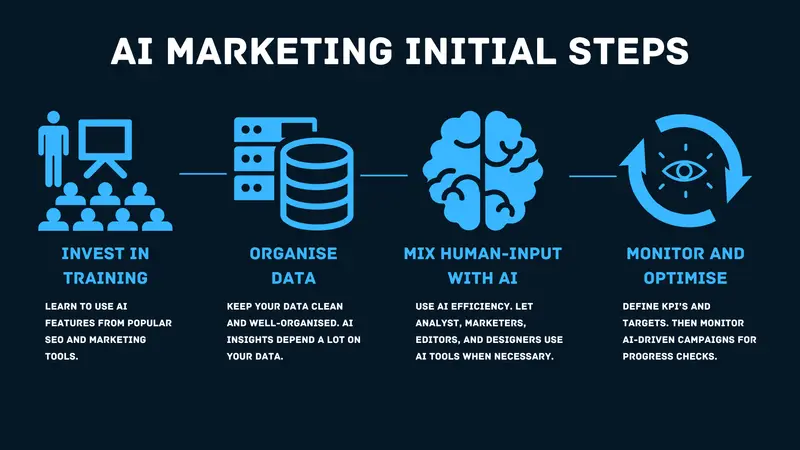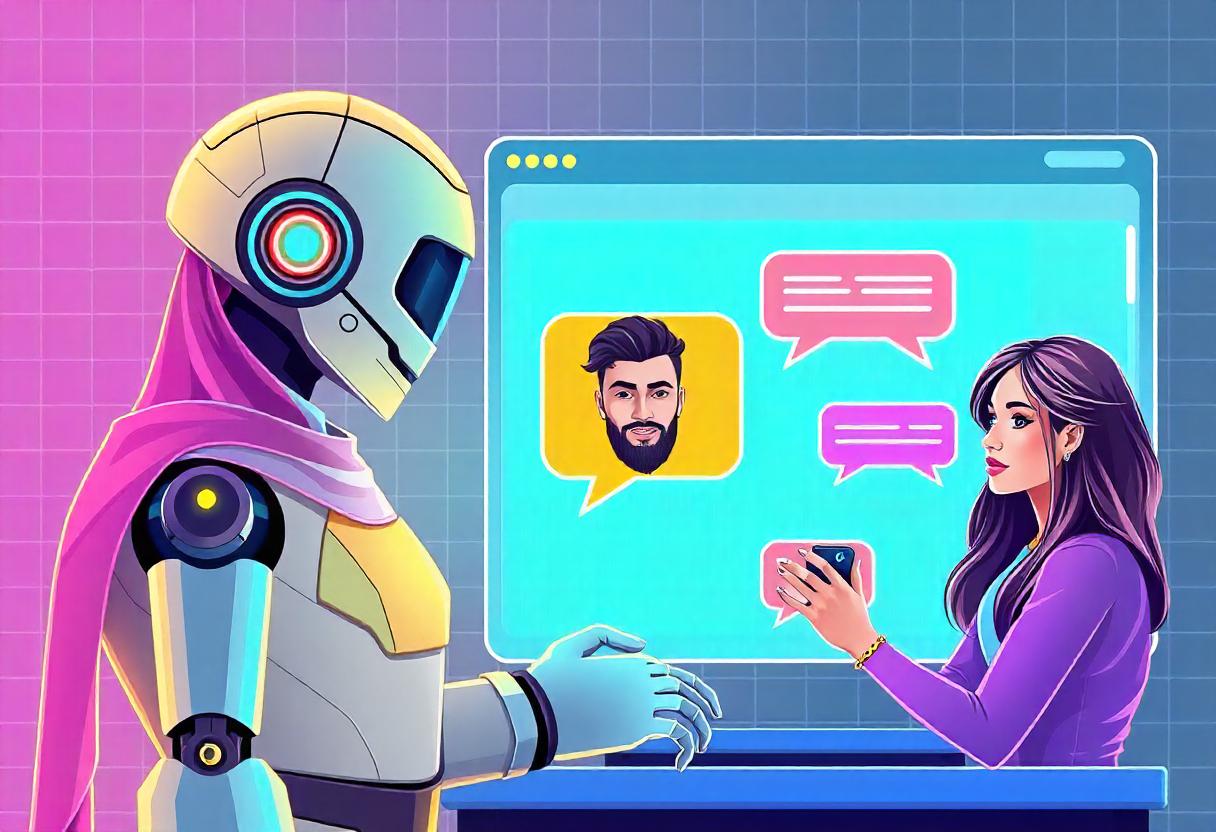How is AI used in marketing today? What does the future of marketing hold? Are there any downsides to using AI in marketing? From analysing customer behaviour to creating AI-generated content to help brands reach their target audiences, this guide explores how AI is used in marketing, its pros and cons, and actionable AI tips for marketers =).
Key Takeaways
- AI has multiple uses in marketing nowadays such as creating content, SEO optimization, smart ad targeting, among others.
- Popular marketing and SEO tools such as Accuranker, Ahrefs, Canva, Google Ads, and others have developed AI features to assist marketers.
- AI Marketing automates repetitive tasks, allowing marketers to focus on strategy.
- The biggest challenges of using AI in marketing are data dependency, bias in algorithms, and lack of human touch.
- Nike, Spotify, Coca-Cola, and other companies have already used AI in their marketing campaigns.
How is AI Used in Marketing Today?

AI is everywhere in marketing nowadays! Here are some AI in marketing use cases:
- Content Creation: Tools like ChatGPT generate ad copies, blogs, social media posts and more with ease.
- Chatbots: AI-powered chatbots provide 24/7 customer support and accurate answers based on internal content or documentation, improving user experience and engagement.
- Predictive Analytics: Brands use AI to forecast trends, customer behaviours, and buying patterns.
- Dynamic Pricing: AI adjusts prices in real-time based on market demand, inventory, and competitor pricing.
- Ad Targeting: Platforms like Google Ads use AI to optimise ad targeting, ensuring the right audience sees the right message.
But wait there is more!
How do Popular Digital Marketing and SEO Tools Use AI Today?
| Tool | AI Usage in Marketing |
|---|---|
| Accuranker | Share of Voice Metrics, Dynamic Tagging, and predictive ranking trend analysis. |
| Ahrefs | Content Gap Analysis, Rank Tracker, and Backlink Audit powered by AI-based suggestions. |
| Canva | Magic Design for AI design suggestions, Background Remover, Text to Image for creative generation. |
| Facebook Ads Manager | Advantage+ Campaigns for automation, Dynamic Creative Optimization, Predictive Analytics for campaign insights. |
| Google Ads | Smart Bidding for automated bid strategies, Responsive Search Ads, Performance Max for campaign optimization. |
| HubSpot | Content Assistant for AI-generated content, Predictive Lead Scoring to prioritize leads, Campaign Assistant for automation. |
| Mailchimp | Creative Assistant for AI-generated designs, Send Time Optimization for email timing, Predicted Demographics for targeting. |
| Salesforce Marketing Cloud | Einstein AI for predictive analytics, customer segmentation, and personalized recommendations. |
| Ubersuggest | AI Writer for content creation, Keyword Discovery Tool for keyword ideas, Traffic Analyzer for insights. |
And there are a lot more examples!
Using AI in Marketing Pros and Cons
Here are some advantages and disadvantages of using AI in marketing:
Advantages
- Efficiency: Automates repetitive tasks, freeing up time for marketers to focus on strategy.
- Personalization: Enables tailored experiences for customers, improving satisfaction and loyalty.
- Data Insights: Processes vast datasets to uncover actionable insights that would take humans weeks to analyze.
- Scalability: Makes scaling campaigns easy and cost-effective, from startups to enterprises.
Disadvantages
- High Costs: Implementing AI systems can be expensive, especially for small businesses.
- Data Privacy Issues: AI relies on massive amounts of data, raising concerns about security and privacy.
- Complexity: Not all marketers have the technical skills to fully utilize AI tools.
- Risk of Over-Automation: Relying too much on AI can lead to campaigns feeling impersonal or robotic.
What are The Biggest Challenges of AI in Marketing?
But it's not all roses, there are several challenges with using AI for marketing purposes such as:
- Data Dependency: AI requires clean, quality data, and poor data can lead to inaccurate results. Structure well your data always!
- Ethical Concerns: AI-based targeting can cross ethical boundaries, like invading customer privacy.
- Bias in Algorithms: If not properly trained, AI can reflect biases in the data, leading to unfair or exclusionary marketing practices. Always check the AI or machine learning model behind the AI tool you plan to use!
- Integration Issues: Implementing AI into existing marketing systems can be complex and time-consuming. Usually requires a skilled development team.
- Lack of Human Touch: AI struggles to replicate the emotional intelligence and creativity of human marketers. Don't rely solely on AI-powered content, editors and graphic designers know better.
Examples of Successful AI-Powered Marketing Campaigns
Spotify’s Personalised Playlists
Spotify’s AI-powered “Discover Weekly” playlist analyses user preferences and listening habits, delivering a personalised music experience that has become one of its most-loved features.
Source: The Future of Music is in AI; thanks to Spotify
Coca-Cola’s AI-Driven Content
Coca-Cola used AI to analyse social media trends and create engaging campaigns. For example, AI identified trending hashtags, helping Coca-Cola craft targeted social media posts.
Source: 5 Ways Coca-Cola is using AI - Case Study
Nike’s AI-Enhanced Shopping Experience
Nike uses AI to create personalised product recommendations on their app, improving customer satisfaction and boosting sales.
Source: Discover how Nike revolutionises retail
Which AI Marketing Tools are The Best for Marketing Tasks?
See our full List of The Best AI Tools for Marketing.
1. Surfer SEO - The Best AI Marketing Tool for SEO Blog Writing
Link: Surfer SEO
Description: Surfer SEO is one of the leading AI SEO tools. It is an SEO auditing tool, but it can also help with content creation and optimisation analysing top-ranking pages and providing data-driven recommendations for creating SEO-optimised blog content.
Best for: Content marketers, SEO specialists, bloggers, digital agencies, and small business owners who want to rank higher in search results
Pricing: Starts from $79 per month
Key Features:
- Real-time content scoring and optimisation suggestions based on SERP analysis
- Boost visibility in Google, ChatGPT, and others
- AI content detector and humaniser
2. Jasper AI - The Best AI Marketing Tool for Copywriting
Link: Jasper AI
Description: A comprehensive AI copywriting platform that helps create high-converting marketing copy across multiple formats and channels. Jasper AI also features add-ons like a plagiarism checker, a grammar checker, an integration with Grammarly, and more.
Best for: Copywriters, e-commerce businesses, and agencies needing scalable content creation
Pricing: Starts from $39 per month
Key Features:
- 50+ copywriting templates for ads, emails, landing pages, and social media
- Brand voice customisation to maintain consistent messaging
- Long-form content assistant for comprehensive articles and blog posts
3. Semrush Content Hub - The Best AI Marketing Tool for Content Optimisation
Link: Semrush Content Hub
Description: Semrush provides a bunch of free tools including but not limited to AI text generator, paragraph rewriter, title generator, proofreading, and more!
Best for: SEO professionals, content marketers, digital marketing agencies, and businesses wanting to optimise existing content for better search performance
Pricing: Freemium
Key Features:
- FREE AI-powered tools for text and title generator, sentence rewriter, proofreading and more!
- Integration with Semrush's extensive keyword and competitor database
- Content gap analysis and improvement recommendations
4. Copy.ai - The Best AI Marketing Tool for Keyword Discovery
Link: Copy.ai
Description: Copy.ai is an AI marketing tool designed for sales and marketing teams that want to use generative AI to create and deploy content at scale. It provides workflows to transform your marketing processes that combine keyword research, content generation, and integrate with other tools.
Best for: Marketing teams, content creators, small businesses, startup founders, and freelancers who need keyword research combined with content creation
Pricing: Freemium
Key Features:
- AI-powered keyword generation based on topics and competitors
- Workflow automation for scaling keyword research processes
- Extensive features to create a variety of content such as blog posts, descriptions, social media posts, and more
5. Grammarly - The Best AI Marketing Tool for Content Quality & Brand Consistency
Link: Grammarly
Description: While known for grammar checking, Grammarly has evolved into a comprehensive AI writing assistant that ensures all your marketing content maintains professional quality and brand consistency across teams.
Best for: Marketing teams, content departments, agencies, remote teams, and businesses needing consistent brand voice
Pricing: Freemium
Key Features:
- AI-powered tone detection and brand voice consistency checking
- Easy integration with existing tools
- Advanced plagiarism detection and citation suggestions for content authenticity
How to Start Using AI as a Marketer?

Here are some tips on how marketers can start using AI in Marketing:
- Start Small: Use AI for specific tasks like email personalisation or ad targeting before scaling up.
- Invest in Training: Learn how to properly use AI features from popular digital marketing and SEO tools such as HubSpot, Accuranker, and others.
- Organise Data: Keep your data clean and well-structure. This will help you leverage AI tools to analyse customer data, make predictions and refine your campaigns.
- Combine AI with Creativity: Use AI for efficiency, but add a human touch to ensure your campaigns feel authentic. Rely on analyst, editors and graphic designers when they suggest to use these tools to boost their efficiency and final outputs.
- Monitor and Optimise: Regularly review AI-driven campaigns to ensure they meet your goals. Set KPI's and targets and monitor progress.
What is The Future of AI in Marketing?

There has been many developments regarding AI in Marketing. Especially with the development multiple AI-driven tools for content creation, video generation, emailing, and more. But it is still very early for what has to come. The future of AI in marketing is exciting! Expect to see:
- Hyper-Personalisation: AI will create even more precise customer experiences based on real-time data.
- Voice Search Optimisation: Marketers will optimise for AI-powered voice assistants like Alexa and Google Assistant.
- AI-Driven Creativity: AI will assist in creating video ads, interactive content, and immersive AR/VR experiences that mimics reality.
- Advanced Analytics: AI will provide deeper insights, helping marketers predict trends with greater accuracy.
